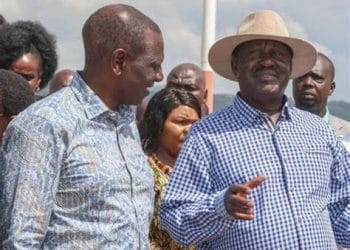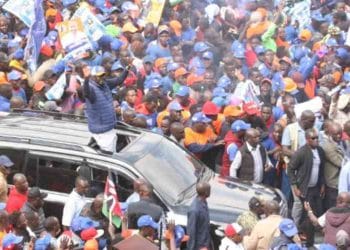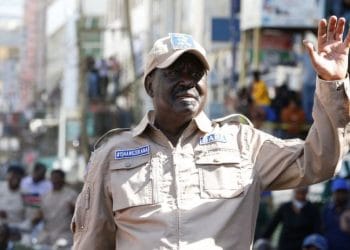Kenyans will from Thursday have the opportunity to view and honour the body of former Prime Minister Raila Amolo Odinga, whose death in India on 15 October has plunged the nation into mourning. The National Funeral Steering Committee has announced detailed arrangements for public viewing, memorial services, and the final journey to his rural home in Bondo.
According to the official programme released late Wednesday, Mr Odinga’s body is expected to arrive in Nairobi aboard a Kenya Airways flight early Thursday morning. It will be received at Jomo Kenyatta International Airport by President William Ruto, senior government officials, ODM leaders, and members of the Odinga family. Military officers will form a guard of honour before the casket is transferred to Lee Funeral Home.
The committee, co-chaired by Deputy President Kithure Kindiki and Siaya Senator Oburu Odinga, confirmed that the body will lie in state at Parliament Buildings from 12:00 p.m. to 5:00 p.m. on Thursday, allowing Kenyans from all walks of life to pay their last respects. Members of the public will be allowed to file past the casket under strict security and time-controlled entry.
“The family wishes to give every Kenyan who loved and respected Baba a chance to say goodbye,” Senator Oburu Odinga said. “We appeal for calm, patience, and dignity during this process.”
Security has been tightened around the city centre, with roads surrounding Parliament temporarily closed to traffic. The National Police Service has urged mourners to use public transport, avoid carrying large bags, and follow guidance from ushers and security officers.
After the viewing, the body will return to Lee Funeral Home overnight, ahead of a national memorial service at Nyayo National Stadium on Friday. The service is expected to draw thousands of mourners, including regional heads of state, diplomats, and religious leaders. Access gates will open at 7:00 a.m., and the programme will begin at 10:00 a.m.
The body will then be flown to Kisumu on Saturday for a brief viewing and procession through the lakeside city, before being transported to Opoda Farm in Bondo, Siaya County, where the burial is scheduled for Sunday.
In line with Mr Odinga’s wishes, his burial will take place within seventy-two hours of his death. The funeral will combine military honours and traditional Luo rites, led by family elders and church leaders. The event will be broadcast live on national television and across digital platforms to allow millions who cannot travel to follow the proceedings.
Government Spokesperson Isaac Mwaura said several public mourning centres will be established in Nairobi, Kisumu, Mombasa, and other towns, featuring large screens for live coverage of the ceremonies. “These centres will help manage the massive crowds expected and ensure that Kenyans everywhere can participate peacefully,” he said.
Authorities have deployed additional security and emergency services in Bondo, where tens of thousands are expected to gather. Roads leading to the Odinga homestead have been graded, and tented camps set up for mourners. The Kenya Red Cross has stationed first aid teams along key routes.
In Nairobi, Parliament staff have prepared a condolence book that will remain open through the viewing period. The Orange Democratic Movement has also placed books at Orange House and in regional offices.
Religious leaders have called for a national moment of reflection during the memorial period. “Raila Odinga stood for justice, dialogue, and peace,” Archbishop Jackson Ole Sapit said. “Let us honour him by preserving the unity and tranquillity that he sought for our nation.”
Across the country, Kenyans have organised candlelight vigils, interfaith prayers, and public processions. In Kisumu, hundreds have gathered at Jomo Kenyatta Sports Ground every evening since news of his death broke, singing liberation songs and offering prayers for his family.
The Ministry of Interior has urged the public to follow official schedules and to avoid unauthorised gatherings that may strain security operations.
As Kenya prepares for the farewell of one of its most influential political figures, the atmosphere is sombre but united. The coming days, marked by public viewing, memorials, and a state funeral, will provide a moment for the country to reflect on the life of a man whose pursuit of democracy shaped its modern history.
For many, filing past Raila Odinga’s coffin will not only be an act of mourning, but also a gesture of gratitude to a leader who, for decades, personified courage, defiance, and hope.



















